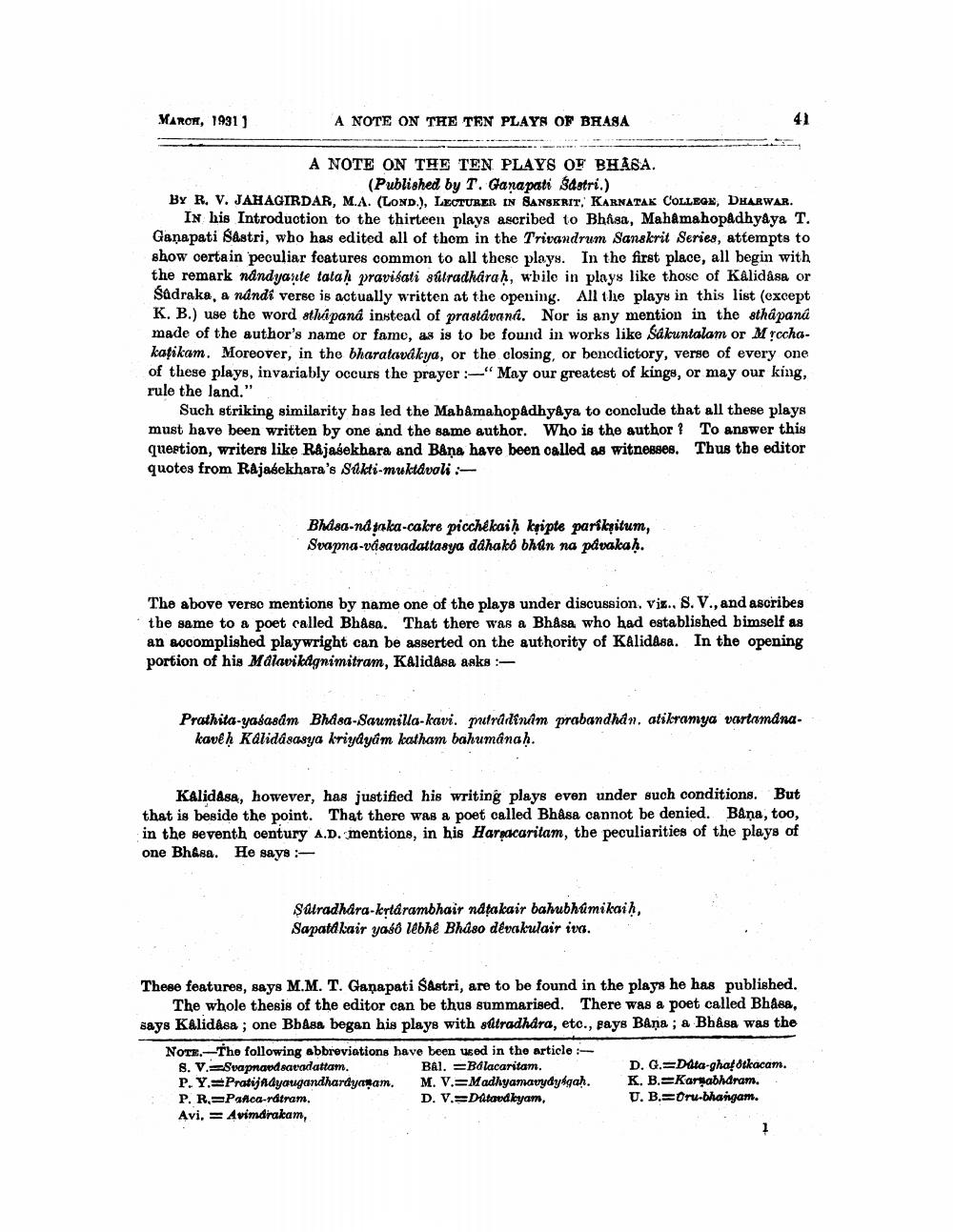________________
MAROR, 1931)
A NOTE ON THE TEN PLAYS OF BĦASAT
41
-
A NOTE ON THE TEN PLAYS OF BHASA.
(Published by T. Ganapati sastri.) BY R. V. JAHAGIRDAR, M.A. (LOND.), LECTURER IN SANSKRIT, KARNATAK COLLEGE, DHARWAR.
In his Introduction to the thirteen plays ascribed to Bhisa, Mahamahopadhyaya T. Ganapati Sastri, who has edited all of them in the Trivandrum Sanskrit Series, attempts to show certain peculiar features common to all thesc plays. In the first place, all begin with the remark nandyante tataḥ pravisati sútradharah, while in plays like those of Kalidasa or Sadraka, a nandi verse is actually written at the opening. All the plays in this list (except K. B.) use the word sthápand instead of prastavaná. Nor is any mention in the sthapana made of the author's name or fame, as is to be found in works like Sakuntalam or Mcchakatikam. Moreover, in the bharatavákya, or the closing, or bencdictory, verse of every one of these plays, invariably occurs the prayer "May our greatest of kings, or may our king, rule the land."
Such striking similarity has led the Mabámahopadhyâya to conclude that all these plays must have been written by one and the same author. Who is the author ? To answer this question, writers like Rajasekhara and Bana have been oalled as witnesses. Thus the editor quotes from Rajasekhara's Sikti-muktavali
Bhasa-nä taka-cakre picchékaiḥ kṣipte parikritum, Svapna-vasavadattasya daha ko bhan na påvaka).
The above verso mentione by name one of the plays under discussion, vix. S. V., and ascribes the same to a poet called Bhasa. That there was a Bhasa who had established bimself as an accomplished playwright can be asserted on the authority of Kalidasa. In the opening portion of his Malavikagnimitram, Kalidasa anks :
Prathita-yasasám Bhdea-Saumilla-kavi. pradinim prabandhan. atikramya vartamdna
kavéh Kalidasasya kriydyam katham bahumanah.
Kalidasa, however, has justified his writing plays even under such conditions. But that is beside the point. That there was a poet called Bhasa cannot be denied. Bana, too, in the seventh century A.D. mentions, in his Harpacaritam, the peculiarities of the plays of one Bh&sa. He says:
Şalradhara-kortárambhair natakair bahubhumikaih, Sapatá kair yaśð lebhê Bhůso dēvakulair iva.
These features, says M.M. T. Ganapati Sastri, are to be found in the plays he has published.
The whole thesis of the editor can be thus summarised. There was a poet called Bhasa, says Kalidasa ; one BbAsa began his plays with sutradhdra, etc., pays Bana; a Bhasa was the Note.-The following abbreviations have been used in the article :8. V.=Svapnavdsavadattam.
Bal. =Balacaritam.
D. G.=Data-ghat otkacam. P.Y.Pratijndyaugandhardyanam. M. V.=Madhyamavydyágah. K. B.=Karmabhdram. P. R.=Pafica-ndtram.
D. V.=Datoodkyam,
U. B.=Oru-bhangam. Avi, = Avimdrakam,




